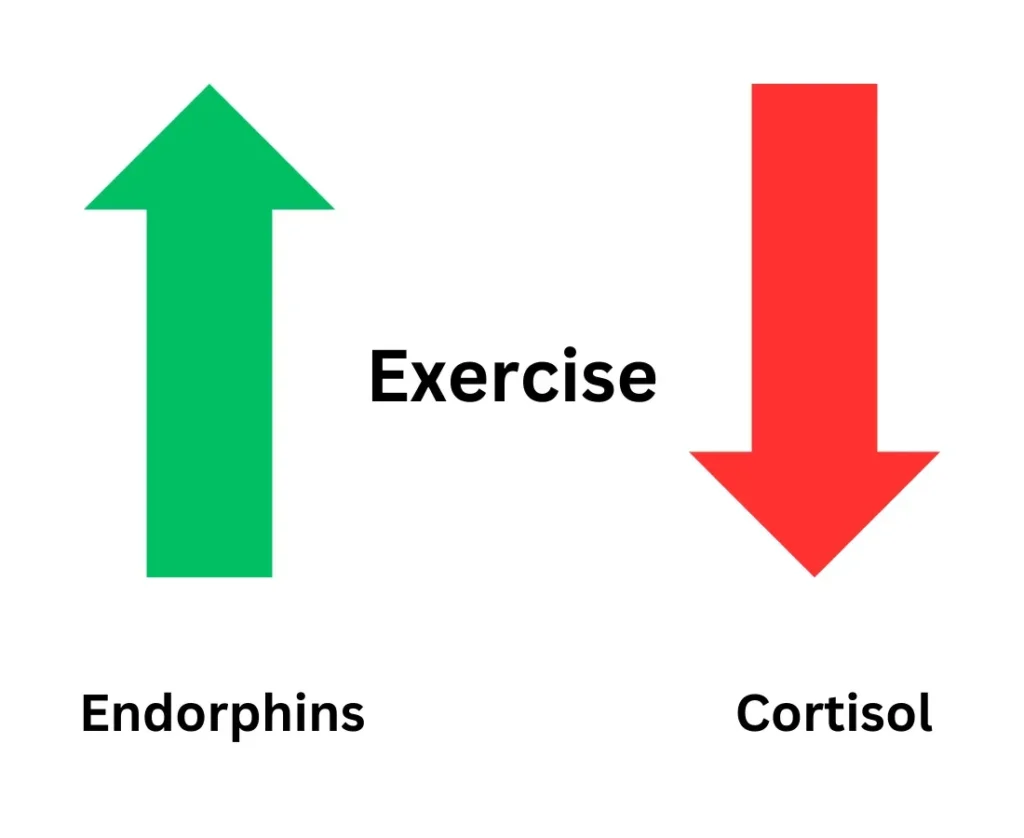Last Updated on November 6, 2025 by shawnshealth
Explore 7 powerful exercise benefits for mental health, including reduced stress, better mood, and sharper cognitive function.
Introduction: Exercise Benefits for Mental Health
The exercise benefits for mental health are more powerful—and more personal—than most people realize. Whether it’s stress that won’t shut off, sleep that never feels deep, or a mood that swings without warning, movement can help reset your system. Not in a vague, feel-good way—but through real chemical shifts, brain rewiring, and emotional grounding.
This isn’t about chasing abs or punishing workouts. It’s about reclaiming control. Feeling more like yourself. And building resilience that lasts. In this guide, we’ll explore seven science-backed ways exercise supports your mental health—plus practical tips to help you start, restart, or stay consistent.
Strength isn’t just physical. It’s emotional, mental, and deeply personal. Let’s dig into how movement can help you feel stronger in every sense of the word.
💪 Strength isn’t just physical—it’s mental, emotional, and deeply personal. If you’re curious what real strength looks like beyond the gym, explore our What Is Strength pillar article.
pillar post for a fresh take on resilience and grit. ☀️ Short on time but ready to move? These Quick Morning Workouts deliver fast wins to boost your mood and energy before breakfast.
🧠 How Does Exercise Improve Mental Health?
- Boosts feel-good chemicals like endorphins
- Lowers cortisol, reducing stress levels
- Increases brain-derived neurotrophic factor (BDNF) for brain health
- Enhances overall emotional resilience
So what does that actually feel like in real life? Let’s start with the most immediate shift—your mood.
😊 Can Exercise Improve Your Mood?
- Yes, regular physical activity triggers dopamine and serotonin
- Helps relieve symptoms of anxiety and depression
- Encourages a positive mental state after just one session
- Acts as a natural mood stabilizer
And once your mood starts to stabilize, sleep often follows. Let’s look at how movement helps you rest easier.
💤 Does Exercise Help You Sleep Better?
- Promotes deeper, more restful sleep
- Reduces time to fall asleep
- Balances circadian rhythms
- Lowers nighttime anxiety that disrupts rest
Better sleep is a win—but what about the stress that keeps you wired? Exercise tackles that too.
🧘♀️ How Does Physical Activity Reduce Stress?
- Burns off excess stress hormones
- Clears the mind through focused movement
- Promotes relaxation post-exercise
- Encourages mindfulness when combined with breath control
When stress fades, your mind clears. That’s where the cognitive benefits kick in.
🧩 How Does Exercise Support Cognitive Function?
- Increases blood flow to the brain
- Boosts memory and learning capabilities
- Helps prevent age-related mental decline
- Supports mental clarity and focus
Sharper thinking is just one piece. Let’s zoom out and look at the full spectrum of mental health benefits.
Table of Contents
Always consult your doctor before starting any new exercise program. The author is not responsible for injuries or health issues arising from the use of this information.
As an Amazon Associate, I earn from qualifying purchases. This means I may receive a commission if you purchase through links on this site, at no extra cost to you.
🤸♀️ Calisthenics training supports both physical and mental health. Learn how bodyweight exercises build strength, boost mood, and improve resilience in this Calisthenics Guide.

Key Exercise Benefits for Mental Health
1. Stress Reduction
One of the most immediate benefits of exercise is its ability to reduce stress. Physical activity increases the production of endorphins, the body’s natural stress relievers.
🔄 Want to go deeper on how movement helps manage stress? Explore how physical activity alleviates stress with practical tips and science-backed insights.

2. Mood Improvement
Exercise has been shown to alleviate symptoms of depression and anxiety. The increase in endorphins also helps to boost mood, creating a sense of well-being and happiness.

3. Enhanced Cognitive Function
Regular exercise improves brain function and protects memory and thinking skills. Physical activity increases blood flow to the brain and promotes the growth of new brain cells.

4. Better Sleep
Exercise can help regulate sleep patterns, leading to better quality sleep. Good sleep is essential for mental health, as it allows the brain to rest and rejuvenate.

5. Increased Self-Esteem
Achieving fitness goals and improving physical health can lead to increased self-esteem and self-worth. Feeling strong and capable in your body translates to a more positive self-image.

6. Social Interaction
Group exercises or fitness classes provide opportunities for social interaction. Building connections and having a support system can significantly enhance mental health.

7. Mental Resilience
Regular exercise builds mental resilience, helping individuals cope better with life’s challenges. It fosters a mindset of perseverance and determination.

How Exercise Improves Mental Health
Exercise is more than just a physical activity; it’s a powerful tool for improving mental health. Here’s how it works:
Boosts Brain Chemicals
Exercise increases the production of neurotransmitters like serotonin and dopamine, which play a crucial role in mood regulation.
Reduces Inflammation
Chronic inflammation is linked to many mental health issues, including depression. Exercise helps to reduce inflammation throughout the body.
Provides a Sense of Accomplishment
Completing a workout or achieving a fitness milestone gives a sense of accomplishment, boosting confidence and motivation.
📚 Further Reading: Trusted Insights on Exercise and Mental Health
If you’re ready to explore the science behind exercise and mental wellness, these expert resources offer deeper context and practical takeaways:
- 🧠 Mayo Clinic: How Exercise Impacts Mental Health Learn how physical activity supports emotional well-being and reduces symptoms of depression and anxiety.
- 🧬 Harvard Health: The Link Between Exercise and Mental Well-Being Discover how movement affects brain chemistry, mood regulation, and long-term mental resilience.
- 🌿 Mental Health Foundation: How Exercise Supports Mental Health Explore the emotional benefits of staying active and how even small changes can improve your mental health.

The Science Behind Exercise Benefits for Mental Health
Studies have shown that regular physical activity can lead to significant improvements in mental health. For instance, a study published in the Journal of Psychiatric Research found that exercise can be as effective as medication for treating mild to moderate depression.
Neuroplasticity
Think of neuroplasticity as your brain’s ability to rewire itself—like updating old software with faster, smarter code. Exercise acts like a system upgrade, helping you form new connections, strengthen memory, and bounce back from stress.
A 2021 study in the journal NeuroImage found that aerobic exercise significantly increased hippocampal volume and improved memory performance in adults over 50—clear evidence of neuroplasticity in action.
Hormonal Balance
Physical activity helps to balance hormones, reducing levels of cortisol (the stress hormone) and increasing endorphins and other mood-enhancing chemicals.

Exercise and Self-Esteem Boost
Achieving fitness goals and noticing physical improvements can significantly boost self-esteem. This sense of accomplishment carries over into other areas of life, promoting a positive self-image.
Setting Achievable Goals
Start with small, achievable goals and gradually increase the intensity and duration of your workouts. This approach helps build confidence and keeps you motivated.
Celebrating Progress
Take time to celebrate your progress, no matter how small. Recognizing your achievements fosters a positive mindset and encourages further efforts.

Better Sleep Through Exercise
Regular exercise helps regulate your circadian rhythm, promoting better sleep quality. Good sleep is crucial for mental health, aiding in emotional regulation and cognitive function.
Types of Exercise for Better Sleep
- Aerobic Exercise: Activities like running, swimming, or cycling can improve sleep quality.
- Strength Training: Lifting weights or doing bodyweight exercises also contributes to better sleep.
- Mind-Body Exercises: Yoga and tai chi can help calm the mind and prepare the body for restful sleep.

Conclusion
The exercise benefits for mental health are extensive and well-documented. From reducing stress and improving mood to enhancing cognitive function and boosting self-esteem, regular physical activity is a powerful tool for maintaining mental well-being. Start incorporating exercise into your daily routine today and experience the transformative effects on your mental health.

🔥 Gear to Help You Achieve Your Health and Fitness Goals 💪
If you’re looking for tools to enhance your fitness journey, check out this. Explore top-rated fitness gear on Amazon to enhance your workouts. Check out the latest picks here! 🛒 to support your workouts and progress.
🚀 Find equipment designed to boost strength, endurance, and overall performance!
⚠️ Short disclaimer: As an Amazon Associate, I earn from qualifying purchases.
🌳 Benefits of Spending Time in Nature
🌿 Spending time in nature can amplify the mental health benefits of exercise. Explore how outdoor environments support emotional well-being and help reduce stress, anxiety, and mental fatigue.
🧠 Frequently Asked Questions About Exercise and Mental Health
1. How often should I exercise to improve mental health?
- Aim for at least 30 minutes, 3–5 times per week
- Even short daily sessions can boost your mood
- Consistency is more important than intensity
2. What type of exercise is best for mental health?
- Aerobic activities like walking, running, and cycling
- Mind-body exercises such as yoga and tai chi
- Resistance training can also improve mood and reduce anxiety
3. Can exercise help with depression?
- Yes, studies show regular exercise reduces symptoms of mild to moderate depression
- Boosts serotonin and endorphins, improving emotional well-being
- Can be as effective as medication for some individuals
4. How long does it take to feel mental health benefits from exercise?
- Mood can improve within minutes of exercising
- Long-term mental health improvements often appear within 2–4 weeks
- Results increase with regular activity
5. Does exercising outdoors offer extra mental health benefits?
- Yes, outdoor workouts reduce stress and boost mood
- Sunlight increases vitamin D and serotonin levels
- Nature exposure enhances relaxation and mental clarity
6. Can exercise help manage anxiety?
- Yes, it lowers cortisol and releases calming brain chemicals
- Provides a healthy distraction from anxious thoughts
- Improves sleep, which helps reduce anxiety symptoms
7. Is it safe to exercise if I have a mental health condition?
- In most cases, yes—with guidance from a healthcare provider
- Start slow and choose low-impact, enjoyable activities
- Exercise can complement therapy and medication
8. Can group exercise improve mental health more than solo workouts?
- Social interaction adds emotional support and motivation
- Group settings may enhance mood and reduce loneliness
- Accountability increases consistency and mental benefits
9. What if I feel too anxious to start exercising?
- Start small—movement doesn’t have to be intense to be effective.
- Even a short walk or gentle stretch can help calm your nervous system.
- Focus on consistency, not perfection.
10. Can exercise help me feel more in control?
- Yes—routine movement builds structure and emotional stability.
- It reinforces a sense of agency and helps you reclaim your day.
- Small wins through movement can ripple into other areas of life.
11. What if I’ve failed at fitness before?
- You’re not alone—many people restart multiple times.
- Shift the goal from perfection to consistency.
- Every step counts, and every restart is a win.
Blessed are those who find wisdom, those who gain understanding. – Proverbs 3:13




